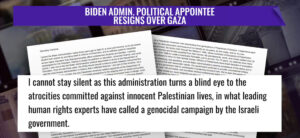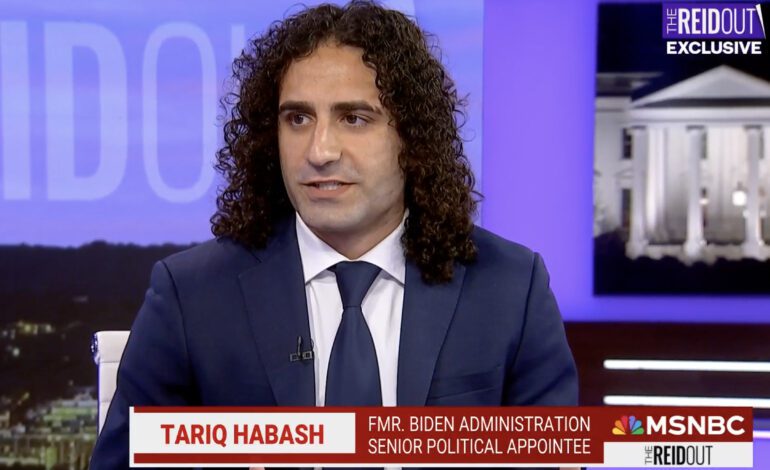WASHINGTON, D.C. — On Wednesday, a Department of Education policy adviser appointed by the Biden administration quit to protest the administration’s continuous military support of Israel’s war on Gaza and its handling of the conflict’s repercussions at home and abroad.
Tariq Habash, a Biden administration appointee who had worked in the education department to help overhaul the student loan system and address inequities in higher education, told The Associated Press he submitted his resignation Wednesday. That was after he and others had “done everything imaginable” to work within the system to try to register their objections to administration leaders, he said.
Habash becomes at least the second official, and the first known official of Palestinian origin, to resign from the administration in protest of President Biden’s actions regarding the war. State Department veteran Josh Paul stepped down in October as the administration accelerated arms transfers to Israel.
Tariq Habash’s resignation is the latest sign of unease within the ranks of the Biden administration over the president’s handling of Israel.
Habash had been among the administration staffers of Middle East, Muslim and Jewish background taking part in meetings with senior White House officials and others in the administration in response to staffers’ concerns on the U.S. role in the war. On Wednesday he described the sessions as more briefings from higher-ups than opportunities for staffers to be heard.
Habash’s two-page letter suggests that whatever Biden has done to rein in Israel has failed to prevent an unfolding humanitarian catastrophe in Gaza.

“I cannot be quietly complicit as the administration fails to leverage its influence as Israel’s strongest ally to halt the abusive and collective punishment tactics that have cut off Palestinians in Gaza from food, water, electricity, fuel and medical supplies, leading to widespread disease and starvation,” he wrote.
He went on to suggest a callousness on Biden’s part in reacting to the death toll in Gaza. At a news conference in October, Biden dismissed casualty reports coming out of Gaza, saying he had no assurance that “the Palestinians are telling the truth about how many people are killed.
“I’m sure innocents have been killed, and it’s the price of waging a war,” Biden added.
In his letter, Habash wrote that “the president has publicly questioned the integrity of Palestinian death counts frequently used by our own State Department, the United Nations and numerous humanitarian non-governmental organizations.”
Habash’s path from enthusiastic campaign supporter to disillusioned official exemplifies the problem Biden faces.
He wrote that he “actively” campaigned for Biden in the 2020 election and helped shape the president’s platform on education issues. When Biden took office, Habash added that he was one of the first political appointees to arrive in the education building.
In a press statement two weeks after Biden’s swearing-in, the Education Department described Habash and other political appointees as a “diverse and accomplished” group.
What began on that hopeful note ended with Habash’s letter criticizing the Biden administration for putting “millions of innocent lives in danger.
“Therefore, I must resign.”

Mindful of growing dissent within the administration, White House officials have made efforts to meet with Arab American, Palestinian American and Muslim American staff members to hear their concerns about the war.
But the blowback persists, straining Biden’s political coalition as he barrels toward a potential rematch with Donald Trump in November. Democratic lawmakers have warned Biden that he could lose Michigan, a crucial swing state with a large Arab American population unless he recalibrates his approach to the war and shows more empathy for Palestinian lives.
The White House referred questions about Habash to the Department of Education and a department spokesperson said “we wish him the best in his future endeavors.”
Biden and his top officials have defended Israel’s devastating air and ground campaign in Gaza as Israel’s rightful self-defense against Hamas. They point to their repeated urging to Prime Minister Benjamin Netanyahu’s government to change how it is fighting the war so as to lessen deaths among Palestinian civilians.
Fallout from the Israeli war on Gaza has roiled campuses across the U.S. and reignited a debate over free speech. College leaders have struggled to define the line where political speech crosses into harassment and discrimination, with Jewish and Arab students raising concerns that their schools are doing too little to protect them.
The issue came to a boil in December when the presidents of Harvard, Penn and MIT were asked to testify at a congressional hearing on campus anti-Semitism. Asked by Republican lawmakers whether calls for the genocide of Jews would violate campus policies, the presidents offered lawyerly answers and declined to say unequivocally that it was prohibited speech.
Their answers sparked weeks of backlash from donors and alumni, ultimately leading to the resignation of Liz Magill at Penn and Claudine Gay at Harvard.
The Education Department has warned colleges that they’re required to fight anti-Semitism and Islamophobia on their campuses or risk a loss of federal money. The agency has opened civil rights inquiries at dozens of schools and colleges in response to complaints of anti-Semitism and Islamophobia in the wake of Oct. 7, including at Harvard, Stanford and MIT.
Education Secretary Miguel Cardona met with Jewish students from Baltimore-area colleges in November and vowed to take action to keep them safe. He later met with the leaders of national Muslim, Arab and Sikh organizations to discuss the rise of Islamophobia on college campuses.
In his resignation letter, Habash wrote, “The Department of Education must play an active role in supporting institutions as they respond to the needs of students, faculty and staff. This includes protecting all students who choose to exercise their first amendment right to engage in nonviolent actions, including expressing solidarity with Palestinians in Gaza.”
Earlier months of the war saw some administration staffers sign petitions and open letters urging Biden to call for a ceasefire.
– AP, NBC contributed to this report. Edited for style.






Leave a Reply